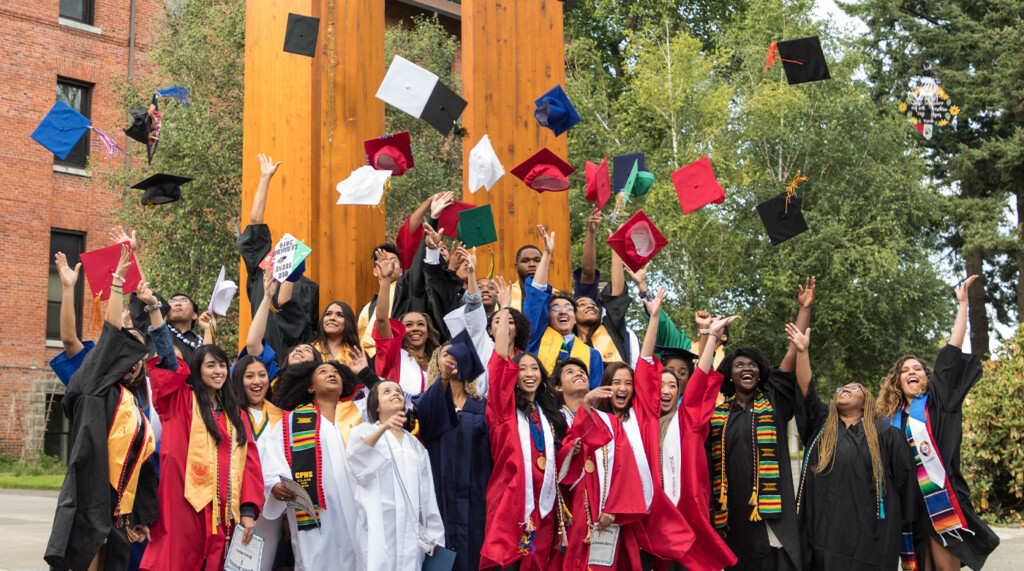Page 159 • (2,207 results in 0.028 seconds)
-
. Retiring regent Don Morken ’60 was honored at Friday’s dinner, and university historian Philip Nordquist presented his new book, “Inquiry, Service, Leadership and Care.” It chronicles PLU’s history from 1988 to 2008 and follows Nordquist’s first volume, “Educating for Service: Pacific Lutheran University, 1890-1990.” Additionally, philosophy professor Erin McKenna and anthropology professor Elizabeth Brusco were thanked for their faculty leadership, and students Carl Pierce, Tamara Power-Drutis and
-

partner with Palmer Scholars,” PLU President Allan Belton said. “We share the organization’s vision for breaking down barriers for students and equipping them to become change-makers in the community.” Palmer Scholars’ mission to assist local students of color to pursue a higher education aligns with PLU’s own goal to educate students for lives of thoughtful inquiry, service, leadership and care. Initially launched in 1983, Palmer Scholars has served more than 600 young adults throughout Pierce
-

community safety measures,” Belton wrote. “We’ll be proceeding with caution, and reserving the ability to change course as the situation requires. We’re continuing to consult with the Tacoma–Pierce County Health Department and other public-health resources, and following their guidance to ensure that our return to campus continues to prioritize safety above all.” “The university’s Pandemic Recovery Planning Team has taken great care to put risk-mitigation strategies in place at PLU that will continue to
-
to be a competitive applicant for OT programs, you must have significant experience in the field through volunteer or paid opportunities working with practicing certified occupational therapists. Admissions committees encourage applicants to seek out observation experiences in diverse settings to provide an understanding of inpatient and outpatient populations. Examples of OT settings may include, but are not limited to: hospitals, clinics (pediatrics, dementia/geriatrics care, physical rehab
-
to discuss why they have chosen to pursue a career in physical therapy and how they perceive the role of physical therapists in health care. During the interview, applicants may be rated on their oral communication skills, professional behaviors and attitudes, ability to interact in a group, knowledge of the profession, ability to solve problems, and motivation to pursue a career in physical therapy. The applicants’ written communication skills may also be measured with an on-site essay.
-
to be a competitive applicant for OT programs, you must have significant experience in the field through volunteer or paid opportunities working with practicing certified occupational therapists. Admissions committees encourage applicants to seek out observation experiences in diverse settings to provide an understanding of inpatient and outpatient populations. Examples of OT settings may include, but are not limited to: hospitals, clinics (pediatrics, dementia/geriatrics care, physical rehab
-
to discuss why they have chosen to pursue a career in physical therapy and how they perceive the role of physical therapists in health care. During the interview, applicants may be rated on their oral communication skills, professional behaviors and attitudes, ability to interact in a group, knowledge of the profession, ability to solve problems, and motivation to pursue a career in physical therapy. The applicants’ written communication skills may also be measured with an on-site essay.
-
Learn how you can Recruit a Lute.We know that campus atmosphere is the number one thing students care about, and the connections made by prospective students and their families with our current students, staff, and faculty play a pivotal role in their decision to apply. You’ve witnessed firsthand PLU’s exceptional support in guiding students as they grow, learn, and pursue their passions while finding their calling. Join us in connecting with the next generation of Lutes.Fill out the Faculty
-
Being an Active Bystander Active Bystanders are folks who intervene to decrease the chance that a bad situation will happen or get worse. PLU needs all of us to become active bystanders who jump in and uplift the campus’ culture of care, because it’s on Lutes to create communities where people feel safe and respected. If you want to be an active bystander, follow these steps: Identify the Problem: The first step to being an effective active bystander is to understand the situation. Issues of
-
perfectly with PLU’s educational mission to link “thoughtful inquiry” (learning) with “service and care for other people, their communities, and the Earth.” While PLU offers a quality education to undergraduates in a variety of disciplines, the Center adds value to a PLU education by helping students, staff, and faculty consider how their lives might promote “human and ecological flourishing.” Among the 95 schools who received Lilly money, PLU has been rated as one of the top five schools who used grant
Do you have any feedback for us? If so, feel free to use our Feedback Form.


